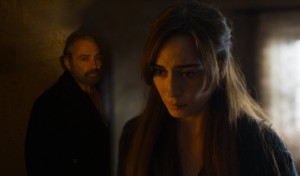 Review: One Night Only
Review: One Night Only
Winter Sleep | Nuri Bilge Ceylan | Turkey | 2014 | 196 min
UW Cinematheque, 4070 Vilas Hall, Friday, February 27, 7:00pm»
Catch what certainly will be one of the best films to play in Madison in 2015 tonight for free at the UW Cinematheque, the Palm d’Or winner from Nuri Bilge Ceylan, Winter Sleep.
Unfortunately my schedule prevented me from writing a more lengthy and timely review of Winter Sleep earlier this week, so let me get straight to the point: Go see Winter Sleep tonight at the UW Cinematheque if you have the opportunity to do so. (If you can’t, queue it at GoWatchIt so that you’ll know when it becomes available to stream or on DVD.)
We’ve been pretty fortunate with the past few Palm d’Or winners at the Cannes Film Festival (The Tree of Life, Amour, and Blue is the Warmest Color) getting full theatrical runs in Madison, so it is a bit disappointing that we’ll only get one opportunity to see Winter Sleep on the big screen. Now that we’re making an effort to go see something in the theaters every week with the Madfilm Meetups, what struck me while watching Winter Sleep is how few challenging—and long—international films we have been able to share as theatrical experiences in Madison recently. I’ll come back to that idea in commentary leading up to the Wisconsin Film Festival in April. But for now if you’re reading this you only have a few hours to decide whether to see what will likely end up on my Best of 2015 list at the end of the year. So go see it.
Winter Sleep is the latest film from Turkish director Nuri Bilge Ceylan, whose previous films, including Once Upon a Time in Anatonia (2011), have played locally at the Wisconsin Film Festival. The film focuses on Aydin (Haluk Bilginer), a retired actor from a wealthy land-owning family who has converted his family home into a bed-and-breakfast hotel. He lives with his much younger wife, Nihal (Melisa Sözen), and his recently divorced sister, Necla (Demet Akbağ). He leaves most of his day-to-day business affairs, including his landlord duties in the local village, to his assistant Hidayet (Ayberk Pekcan), choosing instead to spend his time researching for a book on Turkish theater history, and writing a weekly commentary in the local paper. Aydin is shocked when a young boy throws a rock at him and shatters his car window, and he discovers that the boy’s family was recently humiliated when their television was repossessed when they couldn’t pay Aydin their rent. This event sets off a series of conflicts where long-standing resentments, rooted in class, faith, and so-called traditional values, begin to rise to the surface, and many of Aydin’s flaws and contradictions come to the foreground.
As these conflicts play out, we discover that each of the characters have deep flaws and contradictions. The one common quality they share, however, is their ability to call each other out on these flaws and contradictions. Perhaps my recent viewing of Love Streams influenced me here, but I couldn’t help but think about Cassavetes (minus the histrionics) during the slow-burn in many of the more heated scenes of conflict. As with Cassavetes, it is not always immediately apparent what a given scene is really about until the Ceylan allows the beats to develop and lapse into repetition in a way that becomes psychologically intense, and occasionally brutal.
The cinematography, while warm and gorgeous in many of these intimate interiors, remains pretty basic with close-ups in these extended conversations. In a key and very long conversation between Aydin and his sister, which begins as complimentary and ends as an oppressive ordeal, a cut to a new wider angle after such a long stretch of close-ups provides welcome relief for the viewer. This is not a negative comment; the effect can be overwhelming and surprising in its deceptive simplicity. Allowing these scenes to find their own rhythm contributes to the film’s 196 minute running time, but the individual scenes are so compelling that you welcome the depth of the conversations, despite their frequent unpleasantness.
Each character is more than capable of harming those closest to them, but they retain our sympathy as their own vulnerabilities are exposed. Part of the credit for this goes to some very charismatic actors, especially Bilginer and Sözen, whom you can’t take your eyes off of even when their characters are being petty and vindictive. Winter Sleep is not always a happy viewing experience, but it is a cathartic and rewarding one.